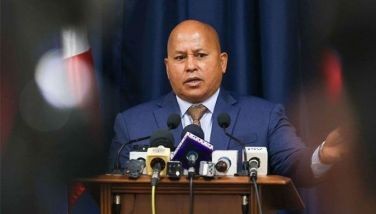Refugees transit through Manila enroute to Seoul
December 16, 2002 | 12:00am
The Philippines has given permission for 20 North Korean asylum seekers in China to pass through Manila on their way to South Korea, officials said yesterday.
The North Koreans are the latest in a stream of asylum seekers fleeing famine and repression in their homeland.
Foreign Undersecretary Lauro Baja said the Department of Foreign Affairs (DFA) approved on Friday a South Korean Embassy request for Manila to allow the transit of the asylum seekers, who took refuge at the South Korean Consulate in Beijing.
Another Philippine foreign affairs official, Antonio Modena, said the group consists of nine males and 11 females, including a 7-year-old girl. The group was expected to transit later Sunday.
Since 1997, the Philippines has allowed 128 North Korean asylum seekers in China to transit through Manila on the condition that South Korea takes them immediately to avoid any political or diplomatic complications.
Such detours are meant to avoid embarrassing China’s communist ally, North Korea, by avoiding direct travel to the rival, capitalist South.
The DFA said this is a form of humanitarian assistance to the asylum seekers since they started to flee to Seoul in 1997.
China has a treaty with North Korea that requires Beijing to send back any asylum seekers. But it has not done so in several cases that have become public, possibly out of concern that sending them back could cause an international outcry.
Tens of thousands of North Koreans live in hiding in northeastern China near the border with their impoverished homeland. Many work as farmhands or marry Chinese farmers who cannot otherwise find spouses.
China does not consider such people legitimate refugees, insisting that they are illegal immigrants seeking economic opportunities.
Last March, 25 North Korean asylum seekers forced their way inside the Spanish embassy in Beijing, threatening to commit suicide if they were sent back.
After negotiations with the Chinese government and the Spanish Embassy, Beijing later agreed to allow the 25 North Koreans passage, but on the condition that the refugees will not fly direct to South Korea from China. – Aurea Calica
The North Koreans are the latest in a stream of asylum seekers fleeing famine and repression in their homeland.
Foreign Undersecretary Lauro Baja said the Department of Foreign Affairs (DFA) approved on Friday a South Korean Embassy request for Manila to allow the transit of the asylum seekers, who took refuge at the South Korean Consulate in Beijing.
Another Philippine foreign affairs official, Antonio Modena, said the group consists of nine males and 11 females, including a 7-year-old girl. The group was expected to transit later Sunday.
Since 1997, the Philippines has allowed 128 North Korean asylum seekers in China to transit through Manila on the condition that South Korea takes them immediately to avoid any political or diplomatic complications.
Such detours are meant to avoid embarrassing China’s communist ally, North Korea, by avoiding direct travel to the rival, capitalist South.
The DFA said this is a form of humanitarian assistance to the asylum seekers since they started to flee to Seoul in 1997.
China has a treaty with North Korea that requires Beijing to send back any asylum seekers. But it has not done so in several cases that have become public, possibly out of concern that sending them back could cause an international outcry.
Tens of thousands of North Koreans live in hiding in northeastern China near the border with their impoverished homeland. Many work as farmhands or marry Chinese farmers who cannot otherwise find spouses.
China does not consider such people legitimate refugees, insisting that they are illegal immigrants seeking economic opportunities.
Last March, 25 North Korean asylum seekers forced their way inside the Spanish embassy in Beijing, threatening to commit suicide if they were sent back.
After negotiations with the Chinese government and the Spanish Embassy, Beijing later agreed to allow the 25 North Koreans passage, but on the condition that the refugees will not fly direct to South Korea from China. – Aurea Calica
BrandSpace Articles
<
>
- Latest
- Trending
Trending
Latest
Trending
Latest
Recommended


































